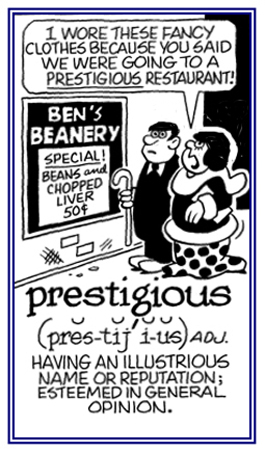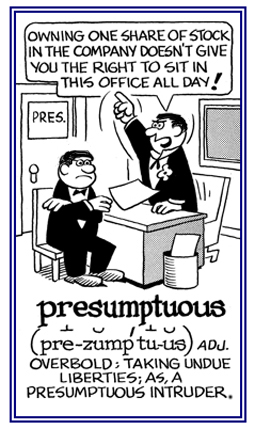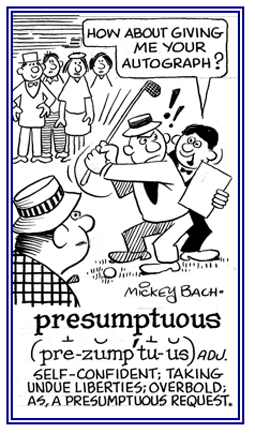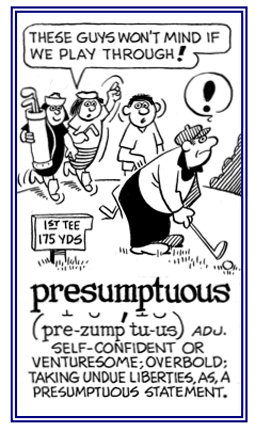pre-, prae-
(Latin: before [both in time and place])
The prefix prae- can actually be substituted for pre- because both of them are different spellings for the same prefix meaning "before".
Someone who is capable of performing magic or conjuring tricks primarily with the fingers: The prestidigitator in front of the store was an artist of deceptive sleight of hand feats.
1. The level of respect at which one is highly regarded by others: Mr. Smith's career as a diplomat brought him a great deal of prestige.
2. A person's high standing among others; honor or esteem: Almost all of the teachers in school had great respect and a high opinion of the principal who gained a lot of prestige over the years.
3. Widely recognized prominence, distinction, or importance: Both Standford University and Princeton University in the United States have an acclaimed standing of achievement and high prestige.
4. Etymology: from Latin praestigiae, "deceptions, illusions, jugglers' tricks; dissimilated from praestrigiae from praestringere, "to bind fast, to tie up; to dull the eyesight, to dazzle"; from prae "before" and stringere, "to draw tight, to bind".
2. A person's high standing among others; honor or esteem: Almost all of the teachers in school had great respect and a high opinion of the principal who gained a lot of prestige over the years.
3. Widely recognized prominence, distinction, or importance: Both Standford University and Princeton University in the United States have an acclaimed standing of achievement and high prestige.
4. Etymology: from Latin praestigiae, "deceptions, illusions, jugglers' tricks; dissimilated from praestrigiae from praestringere, "to bind fast, to tie up; to dull the eyesight, to dazzle"; from prae "before" and stringere, "to draw tight, to bind".
prestigious (adjective); more prestigious, most prestigious
1. Referring to an activity, an institution, a job, or an objective which is greatly respected, esteemed, distinguished, and admired: Sharon received a prestigious award from her company for her outstanding achievements.
2. Etymology: from Latin praestigious, "full of tricks", from praestigiae. "juggler's tricks" from prae-, pre-, "before" + stringere, "to tie" or "to bind".

© ALL rights are reserved.
Go to this Word A Day Revisited Index
2. Etymology: from Latin praestigious, "full of tricks", from praestigiae. "juggler's tricks" from prae-, pre-, "before" + stringere, "to tie" or "to bind".

Go to this Word A Day Revisited Index
so you can see more of Mickey Bach's cartoons.
presume (verb), presumes; presumed; presuming
1. To accept that something is virtually certain to be correct even though there is no proof of it on the grounds that it is extremely likely; to expect; to think to be a fact: Agatha assumed, supposed, or presumed that her children were at school since it was Monday and not Sunday!
Since Mark's firm is prosperous and his work has been very good, he presumes that he will be getting a raise very soon.
2. To behave so inconsiderably, disrespectfully, or over confidently as to do something without being entitled or qualified to do it; usually used in a negative sense: Sarah's fiancé presumed to be very important, bold, and shameless in her mother's home!
1. The action of taking upon oneself of more than is warranted by one's position, right, or ability; forward or over-confident opinion or conduct; arrogance, pride, effrontery, assurance: Little Timmy had the presumption to answer the principal's question in quite a nasty and insolent way.
2. The assumption of taking something for granted, also that which is assumed to be, or to be true, on probable evidence; a belief deduced from facts or experience; assumed probability, supposition, expectation: Mr. Timmons made his presumptions of the issue at hand before he knew all the information concerning the circumstances of the problem.
3. In law, the inference of a fact not certainly known: The statement that James was guilty was just a presumption because not all the details concerning the case were known and proven.
4. In law, the assumption of the truth of anything until the contrary is proved or an inference established by the law as universally applicable to certain circumstances: The presumption that a defendant is innocent of committing murder is given until he or she is proven guilty.
5. A reason for believing; likely evidence: The presumption that Tom kicked his ball through the neighbor's window was probable because he was playing ball in his backyard at the time when the neighbor's window was broken!
2. The assumption of taking something for granted, also that which is assumed to be, or to be true, on probable evidence; a belief deduced from facts or experience; assumed probability, supposition, expectation: Mr. Timmons made his presumptions of the issue at hand before he knew all the information concerning the circumstances of the problem.
3. In law, the inference of a fact not certainly known: The statement that James was guilty was just a presumption because not all the details concerning the case were known and proven.
4. In law, the assumption of the truth of anything until the contrary is proved or an inference established by the law as universally applicable to certain circumstances: The presumption that a defendant is innocent of committing murder is given until he or she is proven guilty.
5. A reason for believing; likely evidence: The presumption that Tom kicked his ball through the neighbor's window was probable because he was playing ball in his backyard at the time when the neighbor's window was broken!
presumptive (adjective); more presumptive, most presumptive
1. Relating to something or someone that gives reasonable grounds for belief and warrants inference: Tom, the driver of the car, had a high alcohol concentration in his blood which was presumptive evidence that he was drunk while driving.
2. Pertaining to an individual or something that is based on deduction; credible, likely: Greg Smith Jr. seems to be the presumptive hier of his father's company.
2. Pertaining to an individual or something that is based on deduction; credible, likely: Greg Smith Jr. seems to be the presumptive hier of his father's company.
presumptively (adverb) (not comparable)
Pertaining to how something is reasonably assumed; presumably: Jack was presumptively late getting started on his trip because he missed his train!
presumptuous (adjective); more presumptuous, most presumptuous
1. Characterizing unduly confidence or boldness in opinion or conduct in a way that is arrogant, impertinent, or rude: Mac was giving presumptuous advice to his supervisor about how the project should be done.
2. Relating to the action of doing something without permission or which is not proper, or done for a good reason: The student's presumptuous interruptions by asking the teacher questions before she was able to finish explaining the exercise was more disruptive than helpful in understanding it.
3. Etymology: from Latin praesumptuosus and praesumere, "to take beforehand, presuppose"; from prae-, "before (in time and place) + sumere, "to take"; which is a compound of sub, "under" + emere, "to take".

© ALL rights are reserved.

© ALL rights are reserved.

© ALL rights are reserved.
Go to this Word A Day Revisited Index
2. Relating to the action of doing something without permission or which is not proper, or done for a good reason: The student's presumptuous interruptions by asking the teacher questions before she was able to finish explaining the exercise was more disruptive than helpful in understanding it.
3. Etymology: from Latin praesumptuosus and praesumere, "to take beforehand, presuppose"; from prae-, "before (in time and place) + sumere, "to take"; which is a compound of sub, "under" + emere, "to take".



Go to this Word A Day Revisited Index
so you can see more of Mickey Bach's cartoons.
presumptuously (adverb) (not comparable)
Relating to how a person behaves beyond what is right or proper; excessively forward and confident or bold in opinion or conduct in a way that is arrogant, impertinent, or rude: Sam was presumptuously advising his supervisor about how to complete the new contract.
The conduct of a person which is pushy, arrogantly self-confident; forwardness: Jack had the presumptuousness or audacity to question the reasonable decision made by the principal of the school.
The interval just preceding the cardiac systole: When Joe's doctor examined him he diagnosed an issue with the presystole, which is the normal rhythmical contraction of the heart during which the blood in the chambers is forced onward.
presystolic (adjective) (not comparable)
Relating to the time immediately preceding that part of diastole, the phase of the cardiac cycle in which the heart relaxes between contractions: Dr. Jefferson explained to Albert that the presystolic problem he had was during the period when the two ventricles were dilated by the blood flowing into them.
pretemporal (adjective) (not comparable)
1. Characteristic of the time before existence began; antemundane: Scientists can only speculate about when organisms started to appear in the pretemporal period.
2. Etymology: from Latin pre, "before" + temporalis, "period of time, season".
2. Etymology: from Latin pre, "before" + temporalis, "period of time, season".
1. A false or desirous claim: When asked specifically what his intentions were, he quickly answered that he had no pretence in wanting to discredit his co-worker.
2. The act of trying to make something appear true when it is actually not the case: At the dinner party, Jim tried to avoid the woman sitting next to him with the pretence of having to make a phone call, although he didn't really want to at all!
2. The act of trying to make something appear true when it is actually not the case: At the dinner party, Jim tried to avoid the woman sitting next to him with the pretence of having to make a phone call, although he didn't really want to at all!
pretend (verb), pretends; pretended; pretending
1. To claim; profess; allege: Jim pretends to the gourmet restaurant in town, but he doesn't have the money to pay for his dinners there!
2. To claim or profess falsely; feign: Jane pretended an emotion to be cool and unfeeling, but actually she could cry her heart out!
3. To make believe, as in play or in an attempt to deceive; feign: In the stage play, Tim had to pretend blindness in the role he had.
2. To claim or profess falsely; feign: Jane pretended an emotion to be cool and unfeeling, but actually she could cry her heart out!
3. To make believe, as in play or in an attempt to deceive; feign: In the stage play, Tim had to pretend blindness in the role he had.
Related before-word units: ante-; antero-; anti-; pro-.
Related "time" units: aevum, evum; archaeo-, archeo-; Calendars; chrono-; horo-; Quotes: Time; tempo-.


